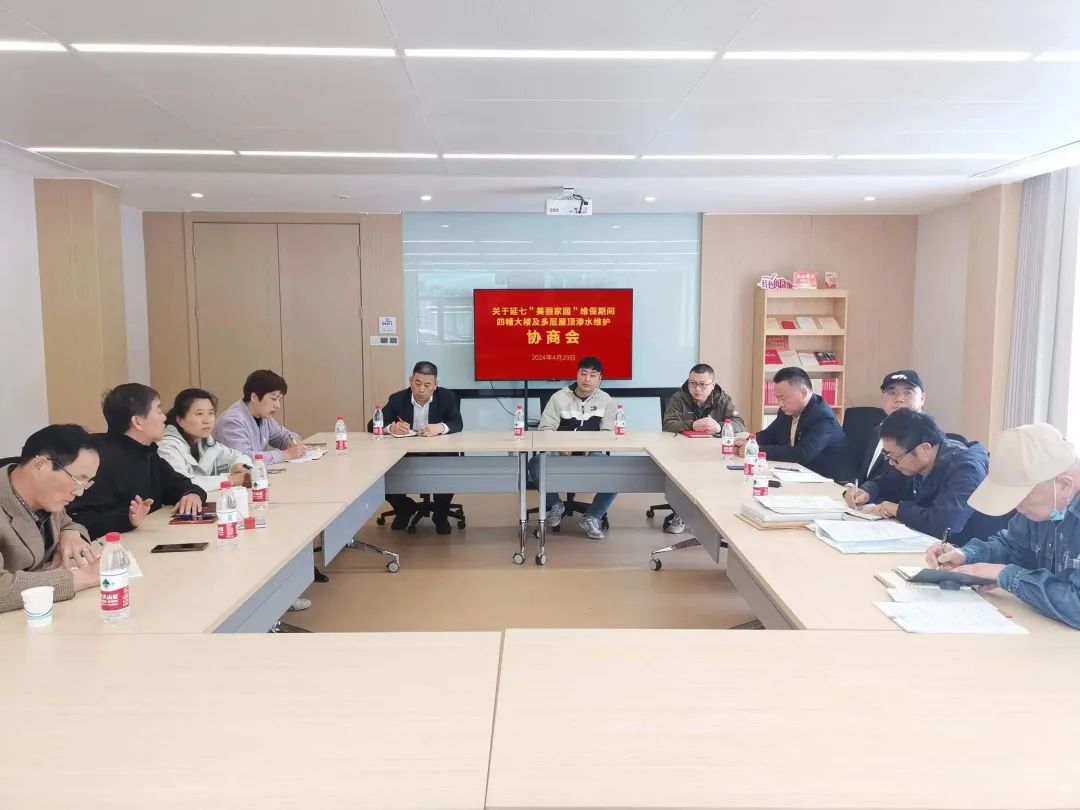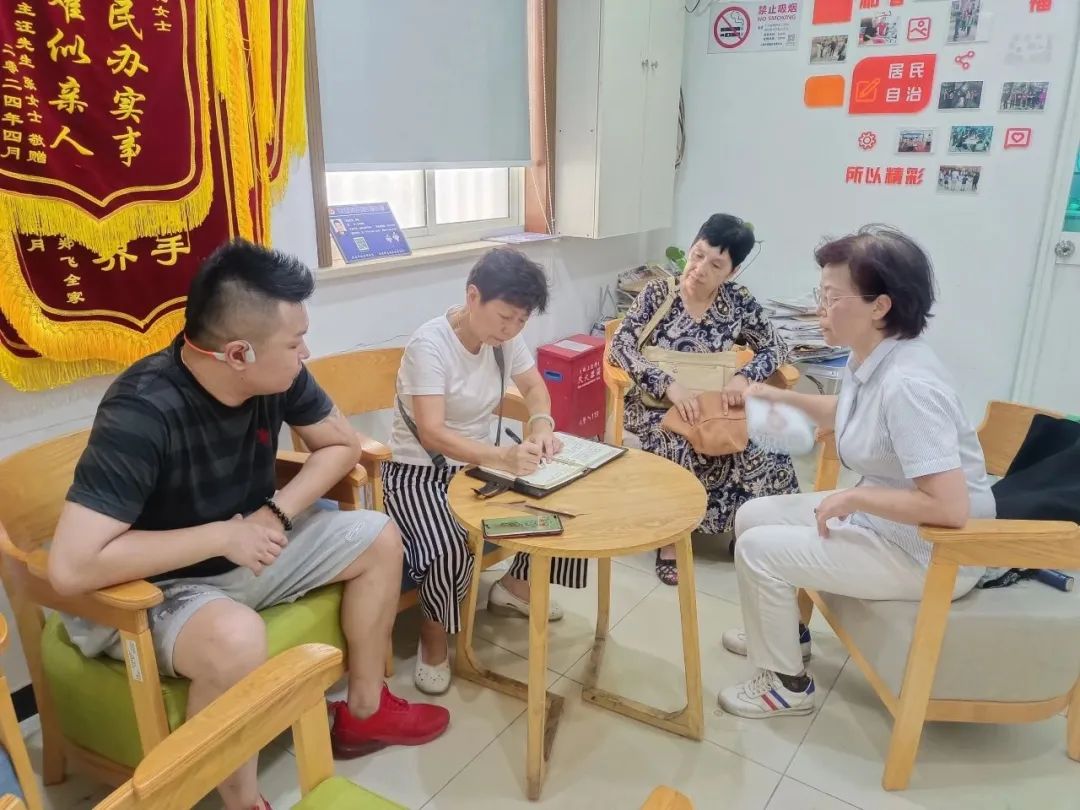Yanji New Village Street - Exploring a New Model of Community "Housekeeper" Property Governance to Build a Good Example of People's City Governance February 10,2025
Yanji New Village Subdistrict deeply studied and implemented the spirit of General Secretary Xi Jinping's important speech during his inspection in Shanghai, comprehensively practiced the important concept of "People's City," and combined with the actual situation of the community. Starting from solving the most concerning, most direct, and most realistic interests of residents in the jurisdiction, and targeting the "hard bone" of property governance in residential communities, since 2019, it has innovatively explored the "Community Housekeeper" work model. Through Party building leadership to integrate community resources, it enables the "troika" of the community to exert force in the same direction, achieving one-stop acceptance of residents' reported problems and full-process closed-loop management, effectively improving the scientific, refined, and intelligent level of urban governance, and actively building a Yanji model of "People's City."
Most areas under the jurisdiction of the Subdistrict Office are after-sales public housing built in the 1980s. In order to solve the problems of aging overall facilities and equipment in the community, imperfect daily management systems, residents having to travel many times to handle affairs, and low participation in grassroots governance, the Subdistrict Office focused on restructuring working mechanisms and stimulating community vitality, and explored a new model of residential property governance work with Yanji community characteristics.
Streamlining the relationship between the three key entities – often referred to as the "troika" – is essential for resolving grassroots conflicts and disputes.
As the "troika" of residential community management – the Residents' Committee, the Owners' Committee, and the Property Management Company – if there is poor communication and unclear responsibilities, it will lead to continuous accumulation and expansion of various problems. For example, residents in old communities often habitually go to the Residents' Committee to report property affairs. The flow between the Residents' Committee and the Property Management Company is not only inefficient, but also seen by residents as "passing the buck" between different organizations. Faced with this situation, it is necessary to adhere to Party building leadership, build a good acceptance and coordination platform, and promote the "troika" to form a joint working force.
Expanding mass participation is an inevitable requirement for stimulating the endogenous driving force of the community
Urban governance must rely on the people and guide the people to actively participate. In residential areas with deep aging like Yanji community, a large number of retired technical and management talents live. For a long time, they have made great contributions to community building as volunteers. How to establish a mechanism to fully leverage their professional capabilities, and avoid the "big horse pulling a small cart" situation that puts these "community treasures" into some simple and repetitive volunteer service dilemmas, is a "must-answer question" for the Subdistrict Office in stimulating residents' participation in residential property governance issues.
Promoting the professionalization of the Owners' Committee is an inevitable requirement for advancing modernization of governance capabilities
Residential property governance involves many highly specialized fields such as laws and regulations, property maintenance, and project cost review. Currently, the Subdistrict Office has achieved full coverage of Owners' Committees in residential communities, and invites industry experts to regularly conduct special trainings, salons, and visits and exchanges. However, as the representative and executive body of the collective will of community owners in residential property governance, in practice, the lack of someone to "lead" and "support" has always restricted the Owners' Committee from playing a greater role. Therefore, the sound operation of the Owners' Committee needs "executive secretaries" and "instructors" to provide professional support, thereby enhancing the professionalism of residential property governance work.
Adhering to Party Building Leadership, Innovating Governance Mechanisms
Building upon the success of early pilot projects, the Subdistrict Office fully implemented the "Community Housekeeper" work model in 2019, thereby innovating governance mechanisms and enhancing its operational pattern. Solidifying the "One Core, Three Rings" system. "One Core" refers to giving play to the political core role of leadership and supervision of the Residents' Committee Party organization; "Three Rings" refer to the "troika," the Housekeeper, and the Subdistrict Office functional departments respectively. Under the leadership of Party building, the "Community Housekeeper" work model connects multiple governance entities such as the Residents' Committee, the Owners' Committee, the Property Management Company, resident units, and social organizations. Implementing the joint reception system. At a fixed time each week, the Housekeeper takes the lead in the "troika," the Urban Construction Center, the Comprehensive Law Enforcement Team, and the Neighborhood Legal Rule Specialists and other parties to conduct reception in a specially set-up joint reception area, providing visiting residents with services such as opinion collection and special consultation. Optimizing problem handling procedures. For general problems, the Housekeeper handles and resolves them according to the principle of "each family takes care of their own children." For problems that cannot be distinguished or need to be handled jointly by multiple entities, the Housekeeper reports to the Residents' Committee Governance Joint Meeting for joint consultation and unified handling. For matters involving the need for functional departments to intervene, the Residents' Committee uses the invitation system, and the Subdistrict Office provides bottom-line support through procedures such as problem collection, research and judgment, on-site consultation, and implementation supervision. Finally, the Housekeeper communicates the handling results to the residents in a timely manner, realizing closed-loop management of problem handling.

Discovering community forces, improving incentives and empowerment
The working concept of the Housekeeper is embodied in the three words "Da" (Big), "Guan" (Manage), and "Jia" (Home). "Da" (Big) refers to the common, cross-border, and professionally supported difficult and complicated diseases in residential community property governance. "Guan" (Manage) refers to the Housekeeper taking all kinds of difficult and complicated diseases in residential community property governance, refusing no one. "Jia" (Home) refers to using the thinking of "home" to resolve conflicts and problems, turning "even an upright official finds it hard to settle a family dispute" into "a housekeeper can settle family disputes."
In terms of the selection of Housekeepers, the Subdistrict Office did not choose to add new positions on top of existing ones, nor did it choose to routinely increase responsibilities. Instead, it cultivated and incubated professional third-party social organizations, and hired "old hands" with rich experience in residential property management to serve as Housekeepers, each responsible for contacting 4-5 Residents' Committees, effectively reducing burdens and enhancing capabilities for the grassroots. Social organizations are responsible for providing professional training, consultation, and guidance to Housekeepers.
On the one hand, Housekeepers do not have the identity of in-system personnel or community workers, but are volunteers who invest in community work out of volunteer spirit. On the other hand, as staffs hired by social organizations, the relevant recruitment, use, training, dismissal and other daily management adopt market-oriented methods. Through a semi-volunteer, semi-market volunteer service model, it has inspired a group of owners with volunteer spirit to become Housekeepers, and then mobilize more owners to participate in community governance.
Focusing on "Three Rights" Support, Clearing Operation Bottlenecks
In response to the phenomena of insufficient exercise of decision-making power, inadequate fulfillment of executive power, and substantial absence of supervisory power in the daily operation of residential community Owners' Committees, the Subdistrict Office, based on continuous sorting and summarization, proposed the concept of "three rights" support for residential property governance to fully empower and enhance the capabilities of Housekeepers. Among them, the supervisory power is the responsibility of the Residents' Committee Party organization, which conducts daily supervision of residential community governance entities. The decision-making power is the responsibility of the Owners' Committee, which makes decisions on the daily work of the community. The executive power is separately granted to the Housekeeper, and the Owners' Committee issues an authorization letter to it, ensuring that the Housekeeper assists the Owners' Committee in carrying out practical operation level work within the authorized scope.
Significant Results Achieved by the Work Model
As of 2024, over the five years of the Community Housekeeper work model, a total of 4,211 various problems in the community reported by residents have been received, and 3,864 have been resolved, with a problem resolution rate of 91.76%. At a horizontal level, the Housekeeper bridges communication gaps within the "troika," all under the guidance of Party leadership. At a vertical level, it enhances the efficiency of functional departments and supports the Residents' Committee through burden reduction and capacity building.
The Housekeeper stated: "Helping residents solve practical problems in a timely manner makes residents satisfied and trust us more." The Residents' Committee stated: "The joint reception by the Housekeeper can solve property governance problems encountered by residents more efficiently. The Residents' Committee can also free up more energy to do other services for the people." The Property Management Company stated: "Through the joint reception by the Housekeeper, the contradictions between the Property Management Company and residents are greatly alleviated, and many problems that were originally going to lead to petitions and lawsuits are resolved in the bud."

A number of urgent and difficult problems with prominent public complaints have been resolved
The Community Housekeeper work model has explored pilot projects for a number of problems that residents have long wanted to solve but failed to solve, such as coordinating the installation of barrier-free ramps in buildings along Songhuajiang Road to solve the travel difficulties of "suspended elderly" caused by eight-step stairs, helping three communities with huge volume differences in Dunhua Road Block 221 to achieve the merger of the Owners' Committee and property management, assisting Yanji No. 7 Village building to achieve autonomous elevator lifting and renewal, introducing the BOT model to batch renovate community electric bicycle sheds and other "key small matters" around residents, realizing "small incision, large depth," and significantly improving the effectiveness of governance.